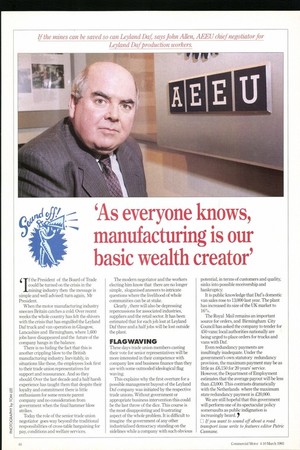'As everyone knows, manufacturing is our basic wealth creator' g/
Page 46

If you've noticed an error in this article please click here to report it so we can fix it.
f the President of the Board of Trade could be turned on the crisis in the mining industry then the message is simple and well advised: turn again, Mr President.
When the motor manufacturing industry sneezes Britain catches a cold. Over recent weeks the whole country has felt the shivers with the crisis that has engulfed the Leyland Daf truck and van operation in Glasgow, Lancashire and Birmingham, where 1,600 jobs have disappeared and the future of the company hangs in the balance.
There is no hiding the fact that this is another crippling blow to the British manufacturing industry. Inevitably, in situations like these, the employees look first to their trade union representatives for support and reassurance. And so they should. Over the last decade and a half harsh experience has taught them that despite their loyalty and commitment there is little enthusiasm for some remote parent company and no consideration from government when the final hammer blow strikes.
Today the role of the senior trade union negotiator goes way beyond the traditional responsibilities of cross-table bargaining for pay, conditions and welfare services. The modern negotiator and the workers electing him know that there are no longer simple, sloganised answers to intricate questions where the livelihood of whole communities can be at stake.
Clearly , there will also be depressing repercussions for associated industries, suppliers and the retail sector. It has been estimated that for each job lost at Leyland Daf three and a half jobs will be lost outside the plant.
FLAGWAVING These days trade union members casting their vote for senior representatives will be more interested in their competence with company law and business finance than they are with some outmoded ideological flag waving.
This explains why the first overture for a possible management buyout of the Leyland Daf company was initiated by the respective trade unions. Without government or appropriate business intervention this could be the last throw of the dice. This course is the most disappointing and frustrating aspect of the whole problem. It is difficult to imagine the government of any other industrialised democracy standing on the sidelines while a company with such obvious potential, in terms of customers and quality, sinks into possible receivership and bankruptcy.
It is public knowledge that Daf's domestic van sales rose to 13,000 last year. The plant has increased its size of the UK market to 16%.
The Royal Mail remains an important source for orders, and Birmingham City Council has asked the company to tender for 450 vans: local authorities nationally are being urged to place orders for trucks and vans with Daf.
Even redundancy payments are insultingly inadequate. Under the government's own statutory redundancy provision, the maximum payment may be as little as £6,150 for 20 years' service. However, the Department of Employment estimates that the average payout will be less than £3,000. This contrasts dramatically with the Netherlands where the maximum state redundancy payment is £20,000.
We are still hopeful that this government will perform one of its spectacular policy somersaults as public indignation is increasingly heard.
Ill If you want to sound off about a road transport issue write to features editor Patric Cunnane.
















































































